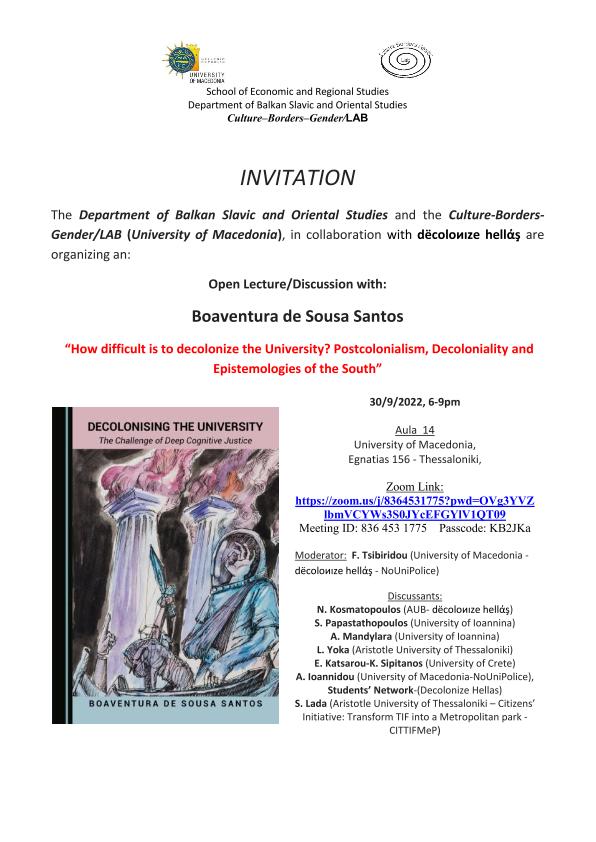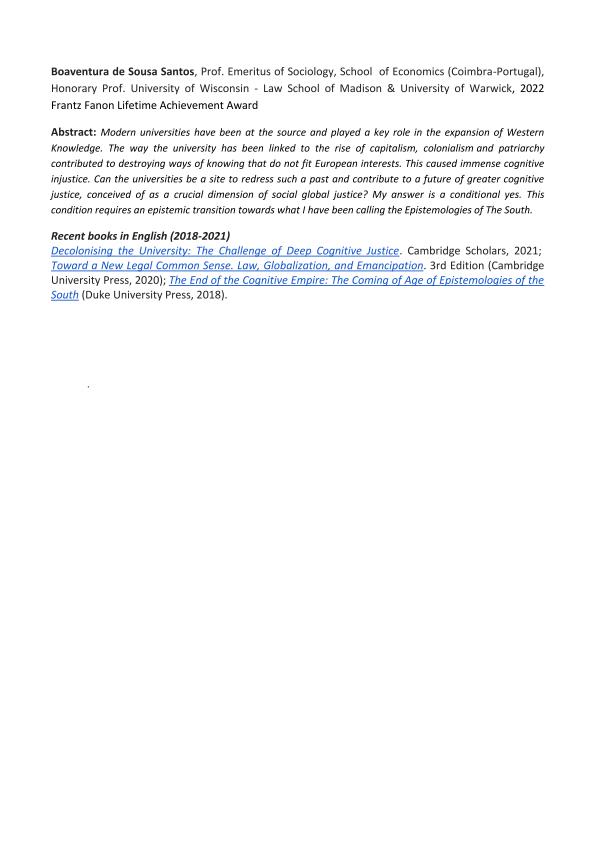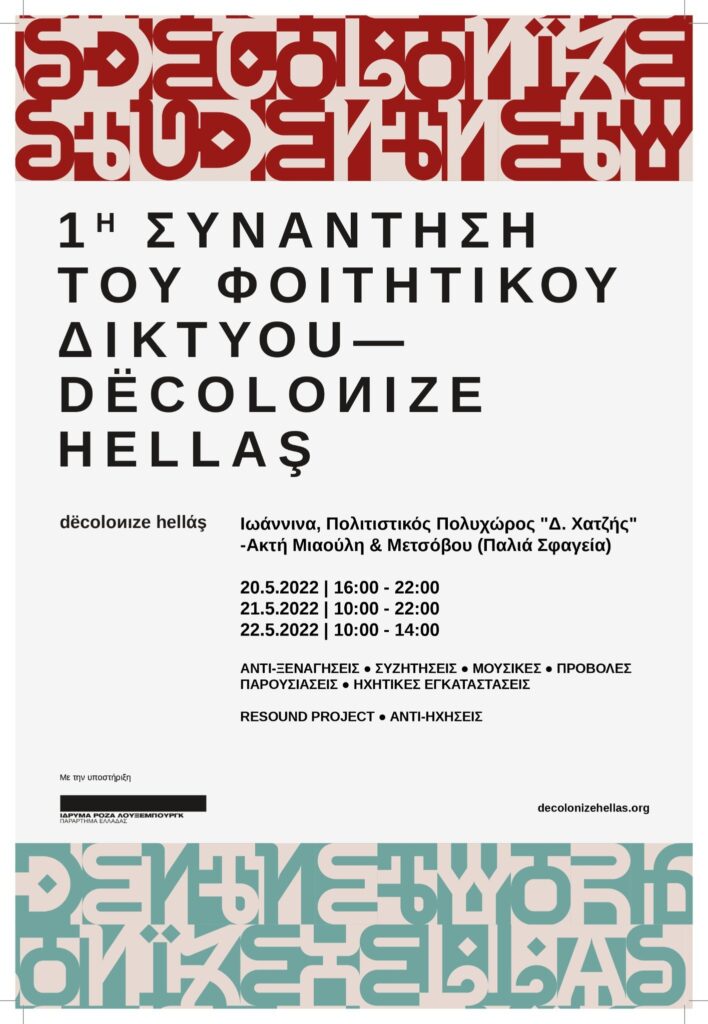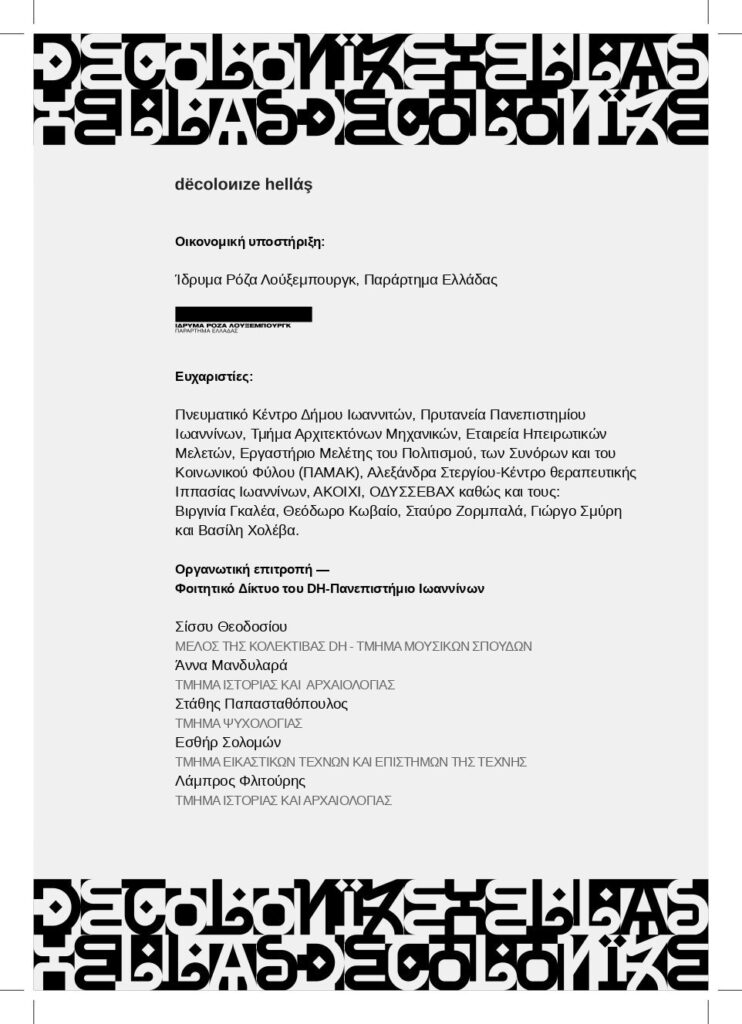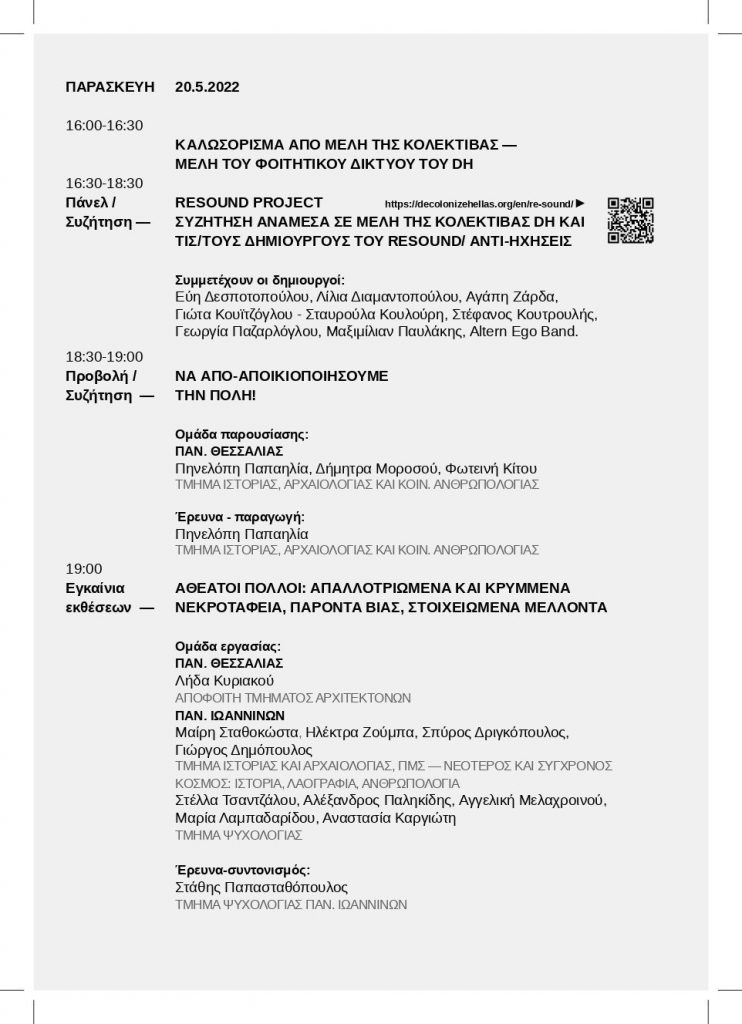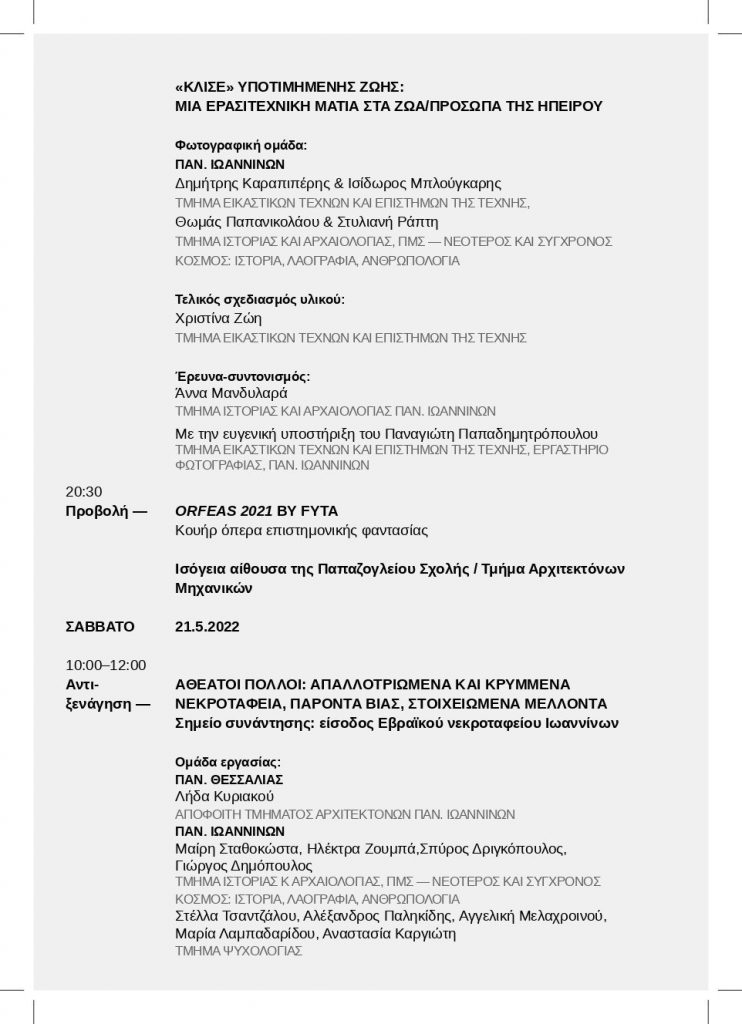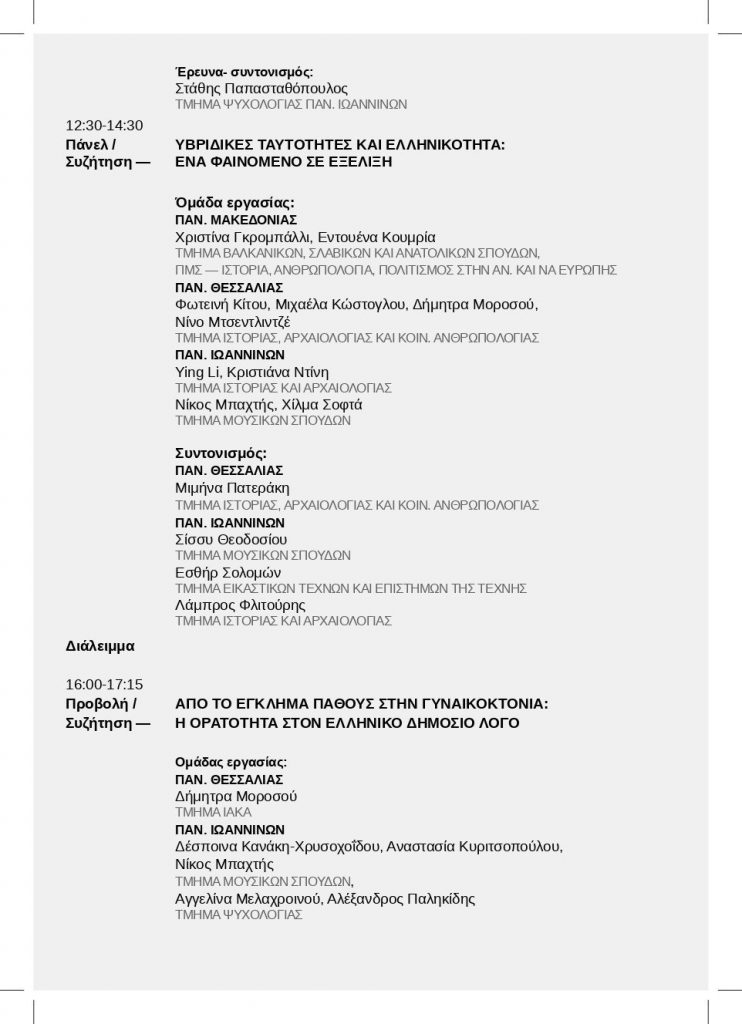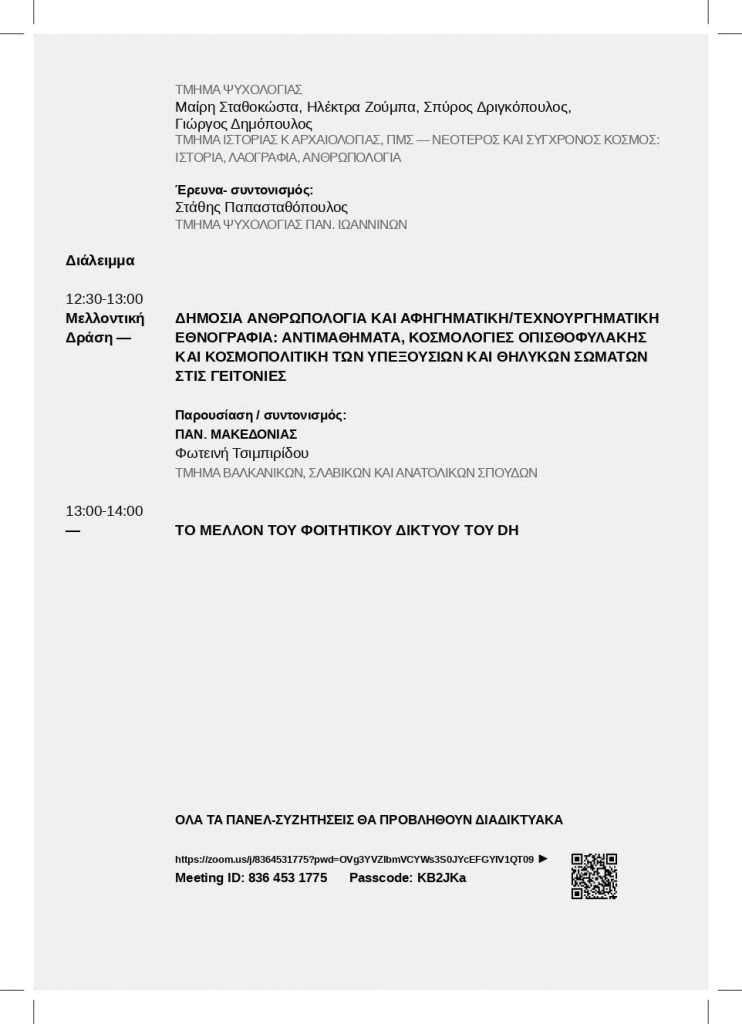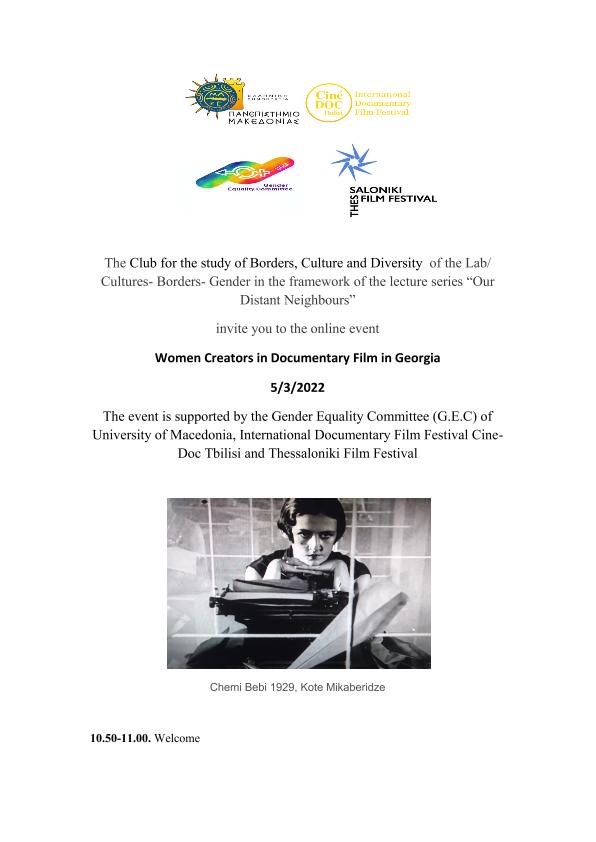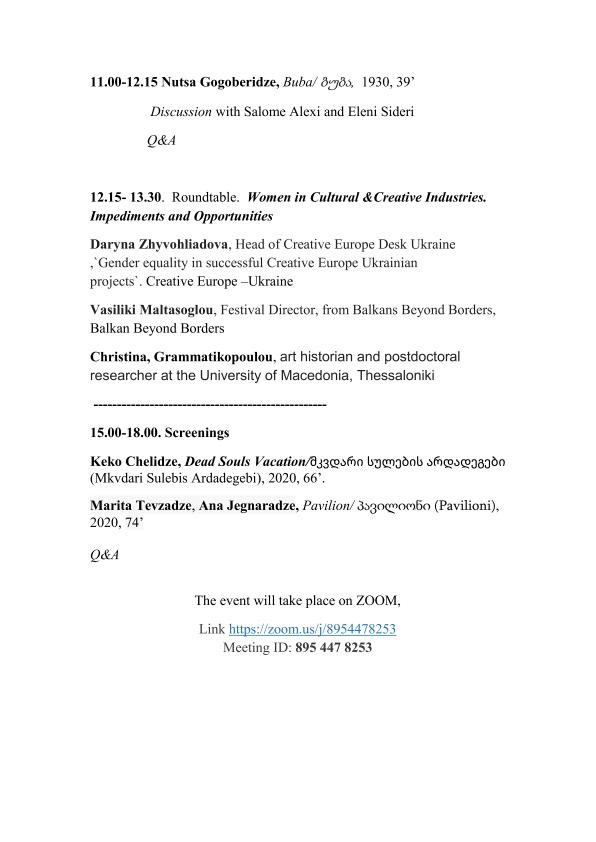 admin
admin
2nd Cycle of Online Educational Seminars ETHNOGRAFEIN
The Ethnography Club — The Culture-Borders-Gender/Lab is organizing seminars for the academic year 2021-2022 with the theme:
“Public Anthropology and Cultural Heritage”
Coordination: Fotini Tsibiridou – Ioannis Manos
The 2nd Cycle, which begins in November 2021, titled “Public Anthropology and Cultural Heritage,” aims to incorporate the above issues within the framework of ‘Public Anthropology.’ This approach engages with society, intertwining the reflective and empathetic critical discourse of anthropological knowledge with alternative practices of critical publicity.
The concept of ‘cultural heritage’ is chosen, in the current period, as a field of reflection and revision of the neo-Hellenic “Self.” The modern Greek national narrative is articulated through performances, rituals, and symbols in public and private discourse and space, which, through politics and pathways of memory, constitute the dominant narrative about cultural heritage. This narrative, with the assistance of state policies, international organizations, local governance, and other collectives that give meaning and reproduce power relations and hegemonies, refers to the idea of continuity and linear progression of historical time while simultaneously creating many gaps and silences.
In this context, alongside the deconstruction of hegemonic discourses, anthropological approaches seek the meanings and dynamics that silences and gaps acquire in the lives of the different, the subaltern, and the collectives, as they are inscribed within the boundaries, margins, and borders of dominant narratives and cultural politics in the public sphere.
Seminar Platform: ZOOM Link https://zoom.us/j/8954478253
Meeting ID: 895 447 8253
Lectures of the 2nd Cycle of ETHNOGRAFEIN
“Φέρνοντας τον Αγιώρη”. Σκέψεις για τη χρησιμότητα της εθνογραφίας με αφορμή μια επιτόπια έρευνα στη Νεστάνη Αρκαδίας
Speaker: Giannis Drinis
PhD in Folklore Studies, University of Ioannina Head of the Department of Intangible Cultural Heritage and Intercultural Affairs, Ministry of Culture and Sports
November 22, 2021, (17:00-19:00)
“Κληρονομιά, Κράτος και Ανατρεπτικός Αρχαϊσμός: Η Αναζήτηση Εναλλακτικών Παρελθόντων και η Εθνογραφική Πράξη“
Speaker: Michael Herzfeld
Ernest E. Monrad Professor Emeritus of the Social Sciences, Department of Anthropology, Harvard University, USA
December 6, 2021, (17:00-19:00)
“Συνομιλώντας με την τέχνη. Ερευνητικές αναζητήσεις και προοπτικές στην προσέγγιση μιας ‘δύσκολης’ πολιτιστικής κληρονομιάς”.
Speaker: Eleana Yalouri
Associate Professor, Department of Social Anthropology, Panteion University
January 17, 2022, (17:00-19:00)
“Οι πρακτικές οικειοποίησης της φύσης ως πολιτισμικές κληρονομιές”.
Speaker: Vassilis Nitsiakos
Professor of Social Folklore, Department of History and Archaeology, University of Ioannina
March 21, 2022, (17:00-19:00)
“Μνημειøκλασία: Δημόσιος χώρος, υλικότητες και η απο-αποικιοποίηση της ιστορίας”
Speaker: Penelope Papailias
Associate Professor of Social Anthropology, Department of History, Archaeology, and Social Anthropology, University of Thessaly
April 4, 2022, (17:00-19:00)
«Οι τουριστικές και αρχαιολογικές οντολογίες της Δήλου: Εμπειρίες “ξέφωτης αλήθειας” και “άκρυπτου” κοσμοπολιτισμού»
Speaker: Despoina Nazou
PhD in Social Anthropology (University of the Aegean) Postdoctoral Researcher, Department of History and Archaeology, University of Crete
May 23, 2022, (17:00-19:00)
Language of presentations: Greek
Inter-Research Exercises in the ‘Refugee Neighborhood’ of Sykies
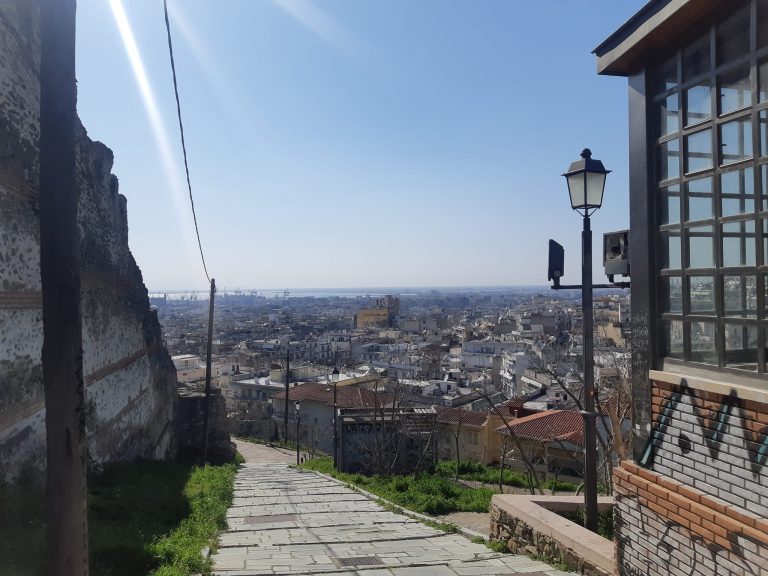
The Culture-Borders-Gender/Lab (UOM) and the Cultural Neighborhood of the Municipality of Neapolis-Sykies are launching their collaboration with ‘Research Exercises in the ‘Refugee Neighborhood’ of Sykies.’
On Friday, May 27, 2022, there will be a guided tour along the ‘refugee neighborhood’ route, followed by a presentation of research activities and planning of joint collaborations between the University and the Municipality of Neapolis-Sykies by the members of the Culture-Borders-Gender/Lab (UOM).
The meeting will take place on May 27, 2022, at 10:00 AM at the entrance of Eptapyrgio.
Interested participants are kindly requested to register using the form below by May 25, 2022: https://forms.gle/YDjg5nEusGqLKyLv7“
1st Meeting of the Student Network Dëcoloиıze Hellάş – Ioannina, May 20-22
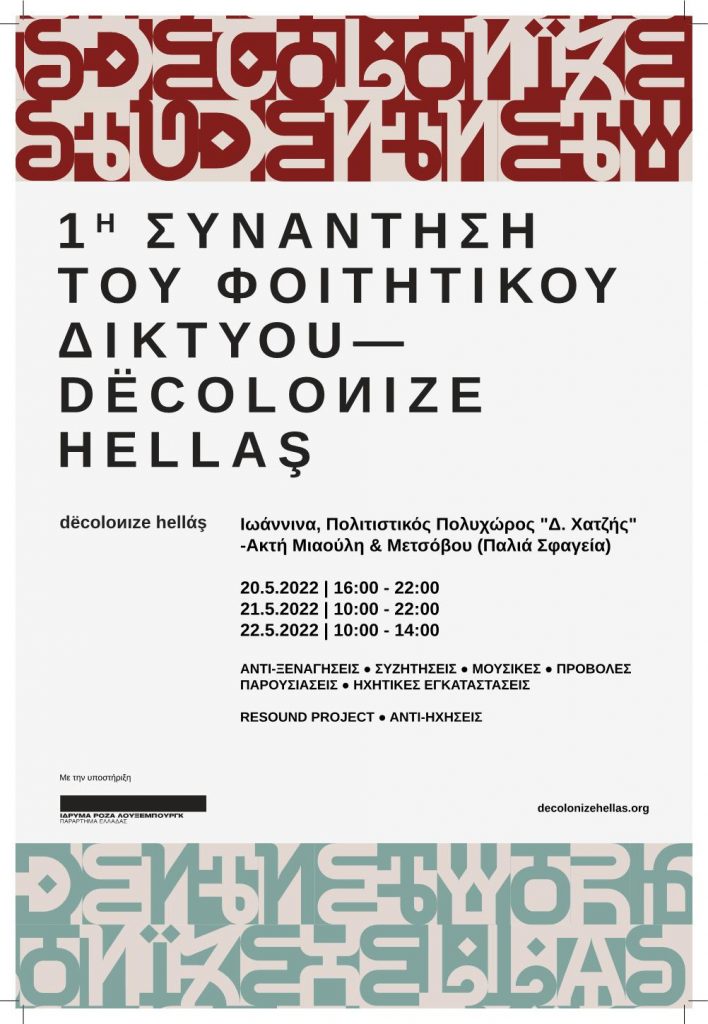
The 1st meeting of the Dëcoloиıze Hellάş student network will make a strong impact in the city and the academic community. The University of Macedonia is one of the 3 member universities of the network!
Educational Seminar on the topic: “Digital Technologies and Research in Social and Humanities Sciences”

Monday, April 11, 2022, 5:00 PM – 8:00 PM
Seminar Platform: ZOOM
Link: https://zoom.us/j/8954478253
Meeting ID: 895 447 8253
Certificates of attendance will be provided to participants who register via the following form: https://forms.gle/FotvigwwugF5ecD86
Languages of the event : Greek & English
Refugee, Society, Culture, Immigration (in greek)
The theme examines the issue of refugees on the occasion of the 100th anniversary of the Asia Minor Disaster and the designation of 2022 as the “year of refugees”. Our email: 22refugee@gmail.com.
The opinions that are heard are expressed by the speakers
Program of the 3rd Online International Seminar for PhD Candidates
25-26 February 2022
Organisation: Culture-Borders-Gender/Lab, Department of Balkan, Slavic, Oriental Studies, PAMAK
“Culture, Borders, Genders: Audiovisual Representations and Interpretive Attempts in the Digital Age”
Seminar Platform: ZOOM
Link: https://zoom.us/j/8364531775?pwd=OVg3YVZlbmVCYWs3S0JYcEFGYlV1QT09 Meeting ID: 836 453 1775 Passcode: KB2JKa
Invited speakers:
–Petros Petridis, Assistant Professor, Department of Social Anthropology, Panteion University
–Iakovos Panagopoulos. Academic Scholar Department of Audio and Visual Arts, Ionian University / Postdoctoral Researcher Panteion University of Political and Social Sciences
3rd Online International Seminar for PhD Candidates
“Culture, Borders, Genders: Audiovisual Representations and Interpretive Attempts in the Digital Age”
25-26 February 2022
Organisation: Culture-Borders-Gender/LAB, Department of BSAS, PAMAK
INVITATION TO PARTICIPATE AND PRESENT AN ANNOUNCEMENT
The Culture- Borders-Gender/LAB organizes the 3rd Seminar for PhD candidates, in order to highlight the work carried out by young researchers.
The invitation to participate and present announcements is addressed to young researchers in the social sciences and humanities and concerns case studies that focus indicatively, and not exclusively, on the following thematic fields but also on their possible combinations:
-Cultural practices, rituals, symbols, institutions, discourses
-Borders and border regions, identities and othernesses, cross-border mobility
-Minority, immigrant and refugee experiences
-Gender relations,body
-Literature, arts, language and translation
-Material culture, space, architecture, monuments
-Digital technologies, digital and audiovisual culture
About the program
-This year’s 3rd Seminar will be held online with the possibility of connecting and watching by anyone interested.
-It will include an online workshop on the topic ” Anthropological Research, and Digital Media: Creating Ethnographic Narratives with New Technologies”
Invited speakers:
–Petros Petridis, Assistant Professor, Department of Social Anthropology, Panteion University
–Iakovos Panagopoulos. Academic Scholar Department of Audio and Visual Arts, Ionian University / Postdoctoral Researcher Panteion University of Political and Social Sciences
-New doctoral and postdoctoral researchers are invited to present specific chapters or topics from their research
-A certificate of attendance will be granted to each interested party.
– Details of the program, participants and other organizational information will be announced in due course.
-Working languages will be Greek and English.
Send summaries
Deadline: February 11, 2021
Contact email: anna@uom.edu.gr, Information: Anna Moumtzoglou
-Summary of 250 words (in Greek or English) with the title of the announcement
-5-8 keywords relevant to the case study
-Contact information: full name, scientific qualification, contact email address

